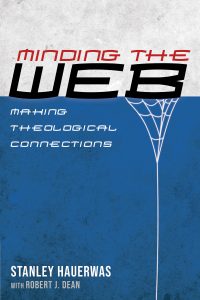“We do not think we live in a time when moral conventions (which is just another word for the Law) determine our lives, but we do. We may not quite be in a Jane Austen world, but we are close. Jane Austen lived in a world of clear social conventions in which everyone knew what was the right thing to do or say, particularly when you were at dinner. Her novels are relentless investigations of whether people who always seem to do the right thing, in fact, have a true heart. Continue reading Life Under the Law When We Are a Law Unto Ourselves (Series on “Minding the Web”)
Category Archives: Minding the Web
Announcing the Publication of “Minding the Web”
 It is with great pleasure that I am able to announce the publication of Minding the Web: Making Theological Connections by Stanley Hauerwas with Robert J. Dean by Cascade Books. The book is currently available for purchase through Wipf and Stock and in the days ahead will be available through many of your favorite book-sellers. Continue reading Announcing the Publication of “Minding the Web”
It is with great pleasure that I am able to announce the publication of Minding the Web: Making Theological Connections by Stanley Hauerwas with Robert J. Dean by Cascade Books. The book is currently available for purchase through Wipf and Stock and in the days ahead will be available through many of your favorite book-sellers. Continue reading Announcing the Publication of “Minding the Web”
On (Not) Knowing our Sins (Series on “Minding the Web”)
“That we may have the haunting thought we are only playing at being a sinner, I suspect, involves the more general worry that, in the world in which we now find ourselves, we are not at all sure if we know what it means to be a Christian. I suspect we are not even sure we know what being a Christian looks like. Surely, to be a Christian means more than being a nice person that believes stuff about God. There is, after all, the Sermon on the Mount. But then that is one of the problems: we cannot imagine living out the demands of the Sermon. But because we cannot imagine living the type of lives the Sermon seems to envisage, we cannot help but fear that we are only playing at being Christian. Continue reading On (Not) Knowing our Sins (Series on “Minding the Web”)
Life Under the Power of Death (Series on “Minding the Web”)
“Consider how death is reported in the news. Those that produce the news seem to know that we have a morbid desire to know how someone died—in an automobile accident—because, as Tolstoy observed, a passion for finding the “cause” of someone else’s death can be a way of satisfying ourselves that they died accidentally or fortuitously by virtue of special circumstances affecting the one who died (but not me). It seems that we are at once obsessed by death while striving in every way possible to conceal its power over our lives. Accordingly, we ask those charged to care for us when we are ill to do everything they can to get us out of life alive. This is yet another form of self-protection, as it means we then get to blame health-care providers for any miseries related to keeping us alive at all costs.”1
This is the fifteenth in a series of posts highlighting captivating, provocative, or simply entertaining quotes from the forthcoming book Minding the Web: Making Theological Connections by Stanley Hauerwas edited by Robert J. Dean (Cascade).
- Stanley Hauerwas, “Resurrection,” in Minding the Web: Making Theological Connections (Eugene, OR: Cascade Books, 185. ↩
The Politics of All Saints’ Day (Series on “Minding the Web”)
“Unless Jesus is the only way to the Father, the martyr cannot exist. For the martyr’s death is her confession that Jesus is Lord, the Messiah of God. The martyrs are those who have died in a manner that make the cross of Christ unmistakable as God’s victory over death. Therefore just as the Father glorifies the Son, the Son glorifies those who suffer for his sake. That is why it is so important that we remember the martyrs, that we remember Stephen. Continue reading The Politics of All Saints’ Day (Series on “Minding the Web”)
The Importance of Novels (Series on “Minding the Web”)
“Yet the novel is all-important for me exactly because it forces one to imagine other lives. In short, novels are an exercise in the enrichment of the imagination through which we develop empathy that is crucial for the acquisition of the virtues.”1
This is the thirteenth in a series of posts highlighting captivating, provocative, or simply entertaining quotes from the forthcoming book Minding the Web: Making Theological Connections by Stanley Hauerwas edited by Robert J. Dean (Cascade).
- Stanley Hauerwas, “In Defense of ‘Our Respectable Culture’: Trying to Make Sense of John Howard Yoder,” Minding the Web: Making Theological Connections, edited by Robert J. Dean (Eugene, OR: Cascade, 2018), 153. ↩